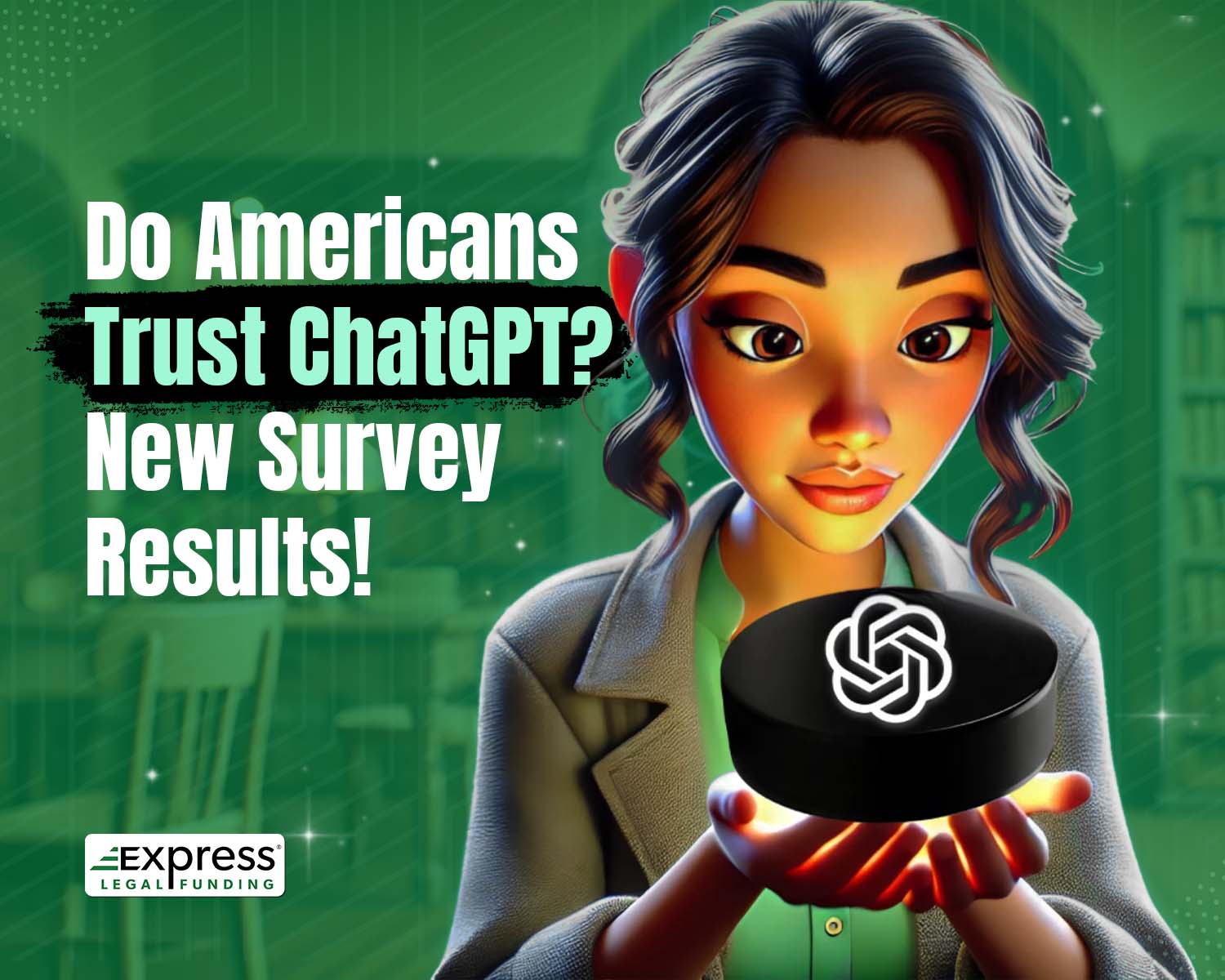
ChatGPT has exploded in popularity, becoming a go-to tool for everything from quick explanations to in-depth advice. But as the AI continues to grow in capability and visibility, a pressing question has emerged: Do people actually trust ChatGPT — and feel safe using it?
ChatGPT Explained: What Is This Generative AI Chatbot?
ChatGPT is an advanced AI agent created by OpenAI that uses natural language processing (NLP) to simulate human-like conversations. It can answer questions, generate content, summarize topics, and assist with decision-making. As its use grows in everyday life, so do questions about AI chatbot safety, accuracy, and reliability.
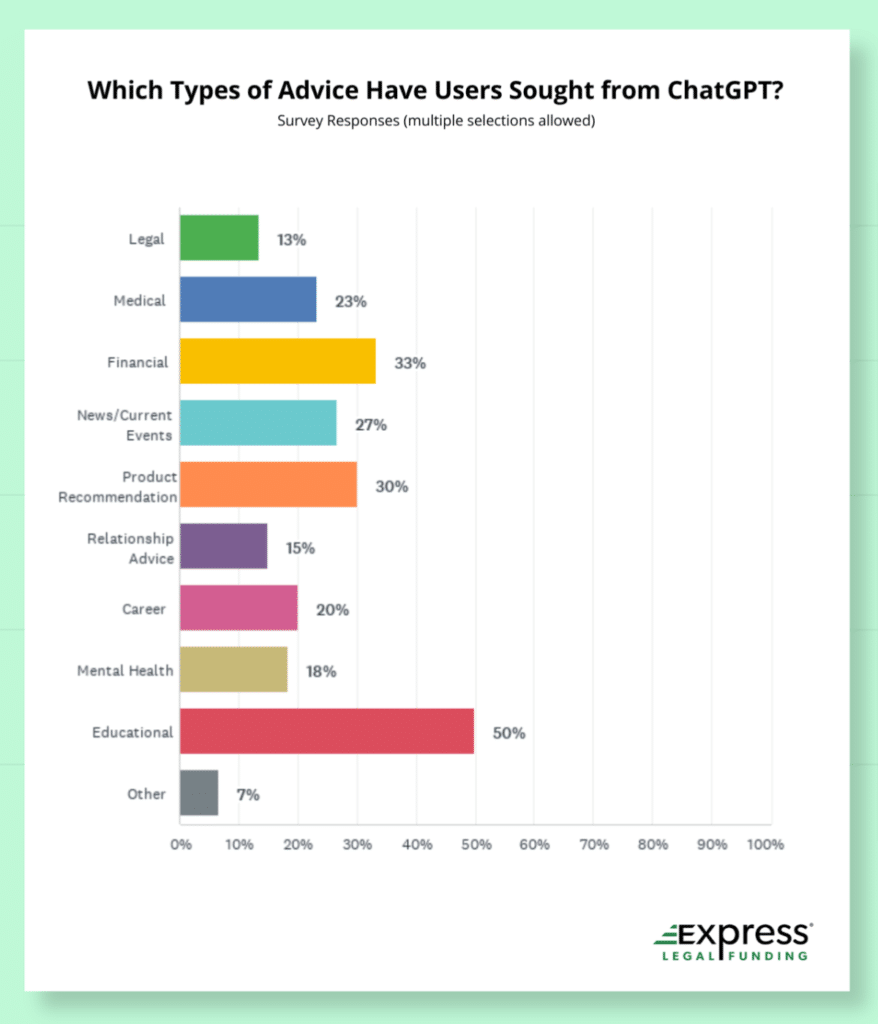
To better understand how people perceive this advanced AI assistant, we conducted a nationwide survey of 100 U.S.-based adults in March 2025. The results offer valuable insight into how Americans are using ChatGPT, what types of advice they trust it to give, and whether they believe it’s a force for good or something more concerning.
This article breaks down the survey data question by question, highlighting usage trends and trust levels across different demographics, including age, gender, income, region, and device type.
Top Insights: How People Use and Trust ChatGPT in 2025
- 60% of U.S. adults say they’ve used ChatGPT for advice or information
- 70% of users found the advice helpful
- Most trusted topics: Career, Education, Product Recommendations
- Least trusted: Legal and Medical Advice
- 34% report they would trust ChatGPT more than an actual human expert
- Only 11.1% believe ChatGPT will improve their finances
- Younger users and iPhone users trust ChatGPT more
- High-income earners and older adults are more skeptical of ChatGPT
- Only 14.1% strongly agree ChatGPT will benefit humanity
ChatGPT Survey: 2025 Methodology and Demographics
- Respondents: 100 U.S.-based adults
- Date Conducted: March 2025
- Platform: SurveyMonkey
- Survey Format: 9 key questions, a mix of yes/no, select-all, trust comparisons, and agreement scales
- Demographics Tracked:
- Age groups: 18–29, 30–44, 45–60, 60+
- Gender: Men and Women
- U.S. Census Region
- Household Income
- Device used: iPhone, Android, Desktop (Mac/Windows)
Survey Objective: Exploring How People Use and Trust ChatGPT for Advice
To uncover how people perceive ChatGPT in terms of trust, safety, and usefulness — and how those opinions differ based on who they are and how they interact with AI.
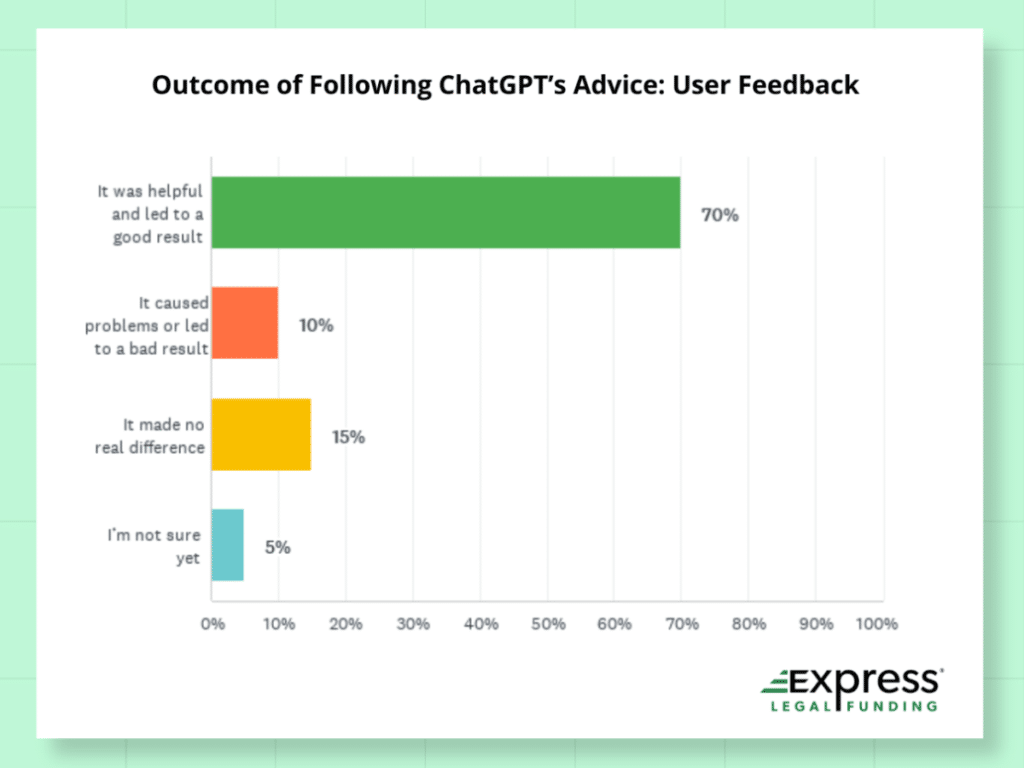
What Questions Were Asked in the ChatGPT Usage and Trust Survey?
To understand how Americans use and trust ChatGPT, our 2025 survey asked participants the following questions:
- Have you ever followed advice or used information from ChatGPT?
- Which types of advice or information have you personally used from ChatGPT? (Select all that apply)
- What was the outcome of following ChatGPT’s advice or information?
- How much do you trust ChatGPT to provide accurate answers or advice in each of the following categories?
- Do you trust ChatGPT more, less, or about the same as Google Search?
- Would you ever trust ChatGPT more than a human expert?
- Do you think ChatGPT should be allowed to give advice on sensitive topics like law or medicine?
- I believe ChatGPT can positively impact my personal finances. (Agreement scale)
- I believe ChatGPT will do more good than harm to humanity. (Agreement scale)
Why Express Legal Funding Conducted This Study About ChatGPT
At Express Legal Funding, we help personal injury and accident victims access financial support while they wait for their legal cases to resolve.
In recent months, CallRail, the call and form tracking tool we use to monitor lead sources, has revealed that several new clients discovered our pre-settlement funding services after asking ChatGPT questions like “What are the best legal funding companies?“
That raised an important question for our team:
How many people are relying on ChatGPT to make major and potentially life altering decisions — including legal and financial ones?
We launched this survey to better understand this growing trend. As more Americans turn to AI for guidance, we wanted insight into how everyday users view ChatGPT’s safety, accuracy, and overall trustworthiness — especially in sensitive areas like law and money.
Who’s Actually Using ChatGPT for Advice?
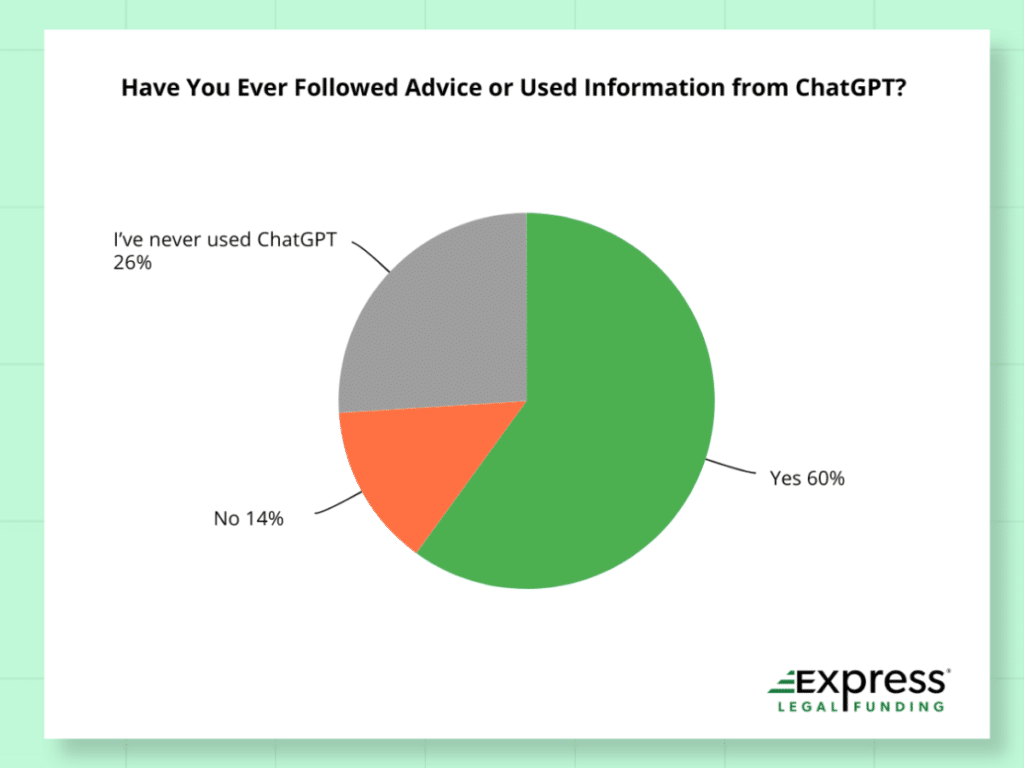
60% of respondents said they’ve used ChatGPT to gather advice or obtain information — a clear majority.
On the other hand, 40% said they had never used ChatGPT or hadn’t followed its suggestions. This shows that while use is growing, a sizable share of the public is still cautious or unaware.
ChatGPT Usage by Demographic: Quick Highlights
- 🧑 Ages 18–29: 84% have used it
- 👵 Ages 60+: Only 22.7% have used ChatGPT
- 📱 Mobile phone users: Most likely to use ChatGPT
- 💵 Lower-income: More likely to try AI tools
- 📍 Southern United States: Highest usage by region
Gender Differences in ChatGPT Usage
Our survey revealed subtle but meaningful differences in how men and women are engaging with ChatGPT. While both groups are using the chatbot at fairly high rates, men were slightly more likely to report using it for advice, while women were more likely to say they’ve never used it at all.
ChatGPT Usage by Gender
| Gender | Used ChatGPT Advice | Used ChatGPT but Didn’t Follow Advice | Never Used ChatGPT |
|---|---|---|---|
| 👩🏽 Women | 58.5% | 15.1% | 26.4% |
| 👨🏼 Men | 63.0% | 13.0% | 23.9% |
These results suggest that men may be more comfortable testing AI tools like ChatGPT or feel more confident applying their advice. In contrast, a larger share of women remain cautious—potentially due to concerns about accuracy, safety, or the risks of AI-generated advice.
This trend is important: AI developers and companies should consider how trust-building features, such as transparency and ethical design, can help close the usage gap.
ChatGPT Usage by Age Group: Generational Differences in AI Adoption
Age plays a significant role in how likely someone is to use ChatGPT. Our survey shows that younger adults are far more likely to engage with AI tools, while older generations remain more hesitant.
ChatGPT Usage by Age Group
| Age Group | Used ChatGPT Advice | Used ChatGPT but Didn’t Follow Advice | Never Used ChatGPT |
|---|---|---|---|
| 18–29 | 84.0% | 8.0% | 8.0% |
| 30–44 | 63.6% | 18.2% | 18.2% |
| 45–60 | 66.7% | 13.3% | 20.0% |
| 60+ | 22.7% | 18.2% | 59.1% |
The gap in age disparity is striking:
- 84% of adults aged 18–29 said they’ve used ChatGPT for advice or information.
- In contrast, only 22.7% of those aged 60 and above have used it.
These numbers suggest that younger adults — who are often more tech-savvy and open to digital experimentation — are driving the adoption of AI chatbots. Older adults may still be skeptical, unfamiliar with the technology, or concerned about its accuracy and safety.
Regional Differences in ChatGPT Usage Across the United States
Our survey found significant regional differences. While some areas show high adoption rates of AI tools, others remain more cautious. The table below breaks down ChatGPT usage by U.S. Census region, revealing trends that may indicate which parts of the country are leading—or lagging—in embracing AI-generated advice.
ChatGPT Usage by U.S. Census Region
| U.S. Region | Used ChatGPT Advice | Used ChatGPT but Didn’t Follow Advice | Never Used ChatGPT |
|---|---|---|---|
| East North Central states | 75.0% | 12.5% | 12.5% |
| East South Central states | 77.8% | 11.1% | 11.1% |
| Middle Atlantic states | 58.8% | 17.6% | 23.5% |
| Mountain states | 80.0% | 0.0% | 20.0% |
| New England states | 100.0% | 0.0% | 0.0% |
| Pacific states | 60.0% | 5.0% | 35.0% |
| South Atlantic states | 36.4% | 27.3% | 36.4% |
| West North Central states | 100.0% | 0.0% | 0.0% |
| West South Central states | 50.0% | 20.0% | 30.0% |
What Types of Advice Are People Getting from ChatGPT?
Many people use ChatGPT for more than just definitions or quick facts. In our 2025 survey, users reported using the AI for practical advice across several areas:
- 📘 Educational help
- 💰 Financial advice
- 🛍️ Product recommendations
- 🏥 Medical questions
- ⚖️ Legal guidance
- 💼 Career advice
- 💞 Relationship advice
- 🧠 Mental health topics
Our survey asked respondents who had used ChatGPT: “Which types of advice or information have you personally used from ChatGPT?” Here is the breakdown of popularity:
Most Common ChatGPT Advice Categories
| Type of ChatGPT Advice Used | % of ChatGPT Users |
|---|---|
| 📘 Educational | 50.0% |
| 💰 Financial | 33.3% |
| 🛍️ Product Recommendation | 30.0% |
| 🗞️ News / Current Events | 26.7% |
| 🏥 Medical | 23.3% |
| 💼 Career | 20.0% |
| 🧠 Mental Health | 18.3% |
| 💞 Relationship Advice | 15.0% |
| ⚖️ Legal | 13.3% |
As the table shows:
- Educational help (50%) was the top use case — highlighting how AI is being used as a learning tool.
- Financial advice (33.3%) and product recommendations (30%) were also popular, reflecting the growing role of AI in daily decision-making.
- More sensitive topics — like medical (23.3%) and legal advice (13.3%) — were used less often, likely due to lower levels of trust.
🔎 This data reveals a clear trend: Americans are willing to consult AI for important life choices, but they’re still cautious in areas where incorrect advice could have serious consequences.
These results show that ChatGPT is not just being used for trivia or writing help — users are turning to it for real advice on real-life matters.
Is ChatGPT’s Advice Helpful — or Harmful?
We asked users to rate the outcome of the advice they received from ChatGPT. Most people found it helpful — but not everyone had a positive experience. Reported outcomes include:
Outcome of ChatGPT Advice
| Outcome of ChatGPT Advice | % of ChatGPT Users |
|---|---|
| ✅ Helpful – It led to a good result | 70.0% |
| ❌ Harmful – It caused problems or a bad result | 10.0% |
| 😐 Neutral – It made no real difference | 15.0% |
| 🤔 Unsure – Not sure yet | 5.0% |
While 70% said the advice helped them, 1 in 10 users reported that following ChatGPT’s guidance actually caused a problem — highlighting the importance of caution, especially with sensitive or high-stakes topics, such as health, finances, or legal decisions.
How Men and Women Perceive ChatGPT’s Advice Outcomes
When we broke down responses by gender, we found that while both men and women generally viewed ChatGPT’s advice positively, there were slight but meaningful differences in perception.
Men were more likely to say the advice was helpful, with 73.3% reporting a positive outcome. In comparison, 66.7% of women said the same. On the other hand, women were more likely than men to report that the advice made no difference or even caused a problem — with 13.3% saying the advice was harmful versus just 6.7% of men.
These differences may reflect varying levels of trust or caution between genders when it comes to AI-generated advice. The data suggests that women, in particular, might be more critical of advice that lacks clear sourcing or accountability, especially when it relates to high-stakes or personal topics.
What Topics Do People Trust ChatGPT to Handle?
Trust in ChatGPT varies widely depending on the topic. People are most comfortable trusting ChatGPT in low-risk categories and most skeptical in high-stakes areas like law and medicine.
Trust in ChatGPT by Advice Category
| ChatGPT Advice Category | % Who Trust ChatGPT |
|---|---|
| 💼 Career | 40.0% |
| 🛍️ Product Recommendation | 38.3% |
| 📘 Educational | 36.7% |
| 💰 Financial | 35.0% |
| 🧠 Mental Health | 28.3% |
| 🗞️ News / Current Events | 26.7% |
| 💞 Relationship | 25.0% |
| 🏥 Medical | 20.0% |
| ⚖️ Legal | 18.3% |
Respondents were most comfortable using it for low-risk areas like career advice and shopping — but trust dropped sharply for medical and legal topics.
This suggests that while many Americans see ChatGPT as useful, they’re still hesitant to rely on it for complex or high-stakes decisions.
Do People Trust ChatGPT or Google More?
Google is still the gold standard for search leading in public trust — but ChatGPT is catching up. We asked respondents whether they trust ChatGPT more, less, or about the same as Google Search.
ChatGPT vs. Google Trust Comparison Among Users
| Trust Comparison | % of Respondents |
|---|---|
| 📉 Much less | 14.3% |
| ➖ Slightly less | 26.5% |
| ⚖️ About the same | 42.9% |
| 🔼 Slightly more | 12.2% |
| 📈 Much more | 4.1% |
Nearly half said they trust both equally, but 40.8% still trust ChatGPT less — showing that while AI is gaining ground, traditional search engines still hold an edge in public trust.
Can ChatGPT Be Trusted More Than Human Experts?
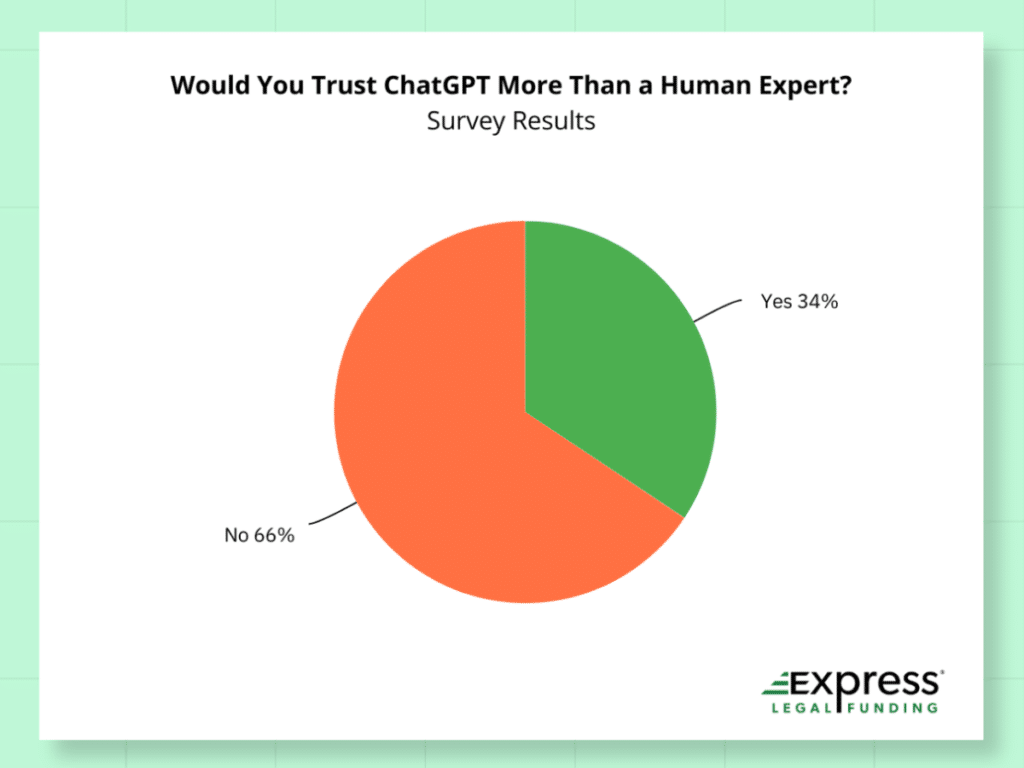
We asked whether people would ever trust ChatGPT more than a real-life expert. While most still prefer human judgment, a significant share said they would trust ChatGPT more in certain situations.
Trust in ChatGPT vs. Human Experts - Survey Data
| Trust in ChatGPT vs. Human Experts | % of Respondents |
|---|---|
| Yes – Trust ChatGPT more than a human expert | 34.3% |
| No – Do not trust ChatGPT more than a human expert | 65.7% |
Over one-third of Americans are open to relying on AI over human professionals — a signal that convenience and perceived objectivity may be reshaping how people view authority.
Should AI Be Allowed to Give Legal or Medical Advice?
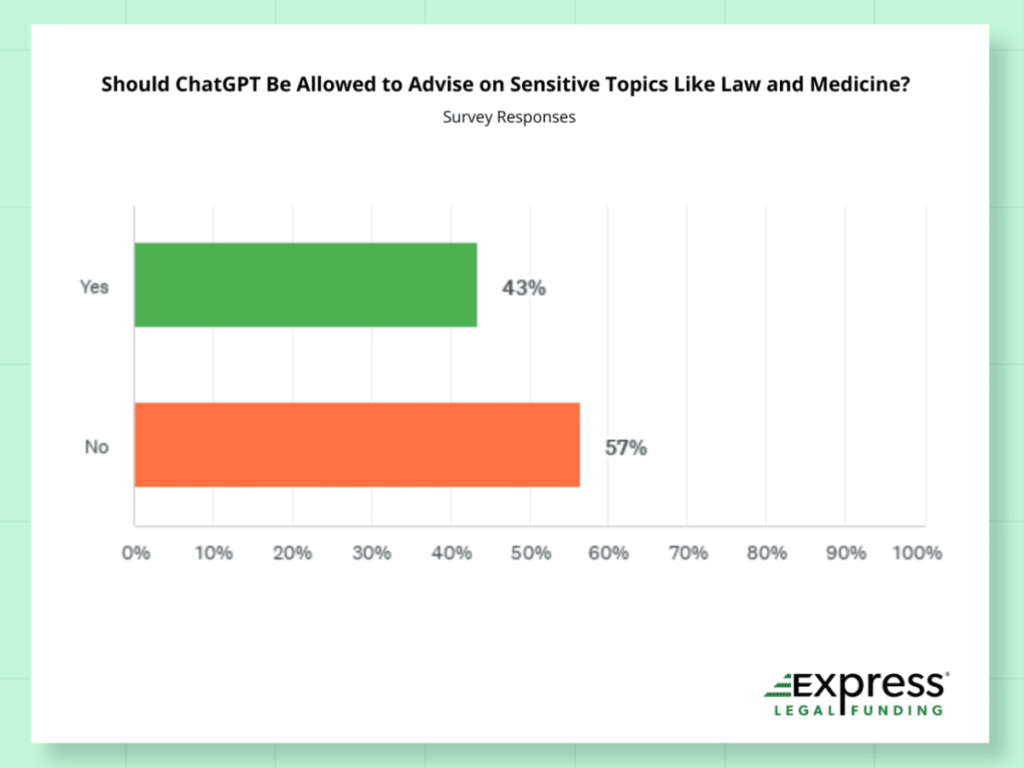
Even though many people use ChatGPT for guidance, most aren’t comfortable with AI taking on serious roles. We asked whether ChatGPT should be allowed to give legal or medical advice.
Nearly two-thirds of respondents said no, reflecting strong concerns about safety, accuracy, and the potential consequences of AI-generated advice in high-risk situations.
Should ChatGPT be Allowed to Give Medical or Legal Advice?
| Opinion on ChatGPT Giving Medical/Legal Advice | % of Respondents |
|---|---|
| 👍 Yes – AI should be allowed to give legal or medical advice | 21.2% |
| 👎 No – AI should not be allowed to give legal or medical advice | 63.6% |
| 🤔 Unsure | 15.2% |
AI legal guidance is still risky compared to working with a real attorney.
Will ChatGPT Improve Personal Finances?
Many people turn to ChatGPT for financial advice, but few believe it will actually improve their financial situation. We asked respondents how much they agree that ChatGPT will positively impact their personal finances.
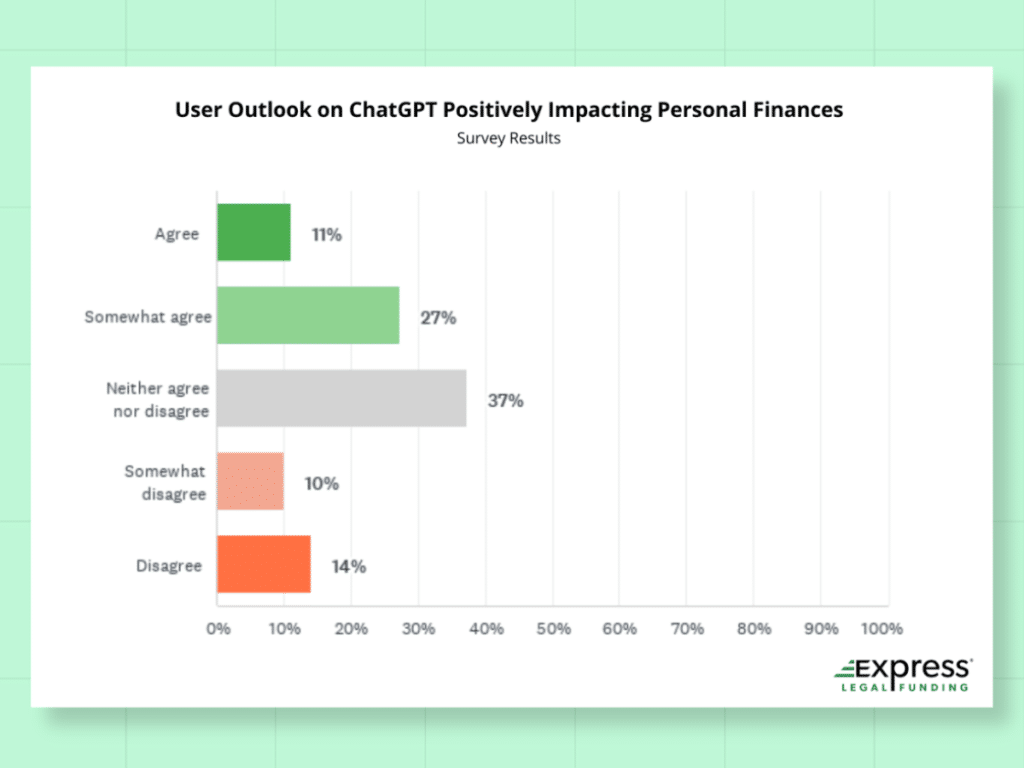
Only 11.1% agreed it would help financially, while over 14% disagreed. This gap between usage and belief shows lingering doubt about whether AI advice can truly deliver positive real-world financial results. Pessimism outweighs optimism when it comes to the potential impact ChatGPT will have on individual finances.
💬 Real Financial Advice from Human Experts
While ChatGPT can offer general tips, legal funding decisions require real expertise and personalized support. For accurate, human-reviewed guidance:
These guides are written by professionals who understand how the pre-settlement legal funding process works inside and out.
Will ChatGPT Be Good or Harmful for Humanity?
We asked respondents to share their overall outlook on ChatGPT’s impact on society. The results show a mix of optimism, skepticism, and uncertainty.
Belief in ChatGPT’s Impact on Humanity
Beliefs About ChatGPT’s Impact on Humanity
| Beliefs About ChatGPT's Impact on Humanity | % of Respondents |
|---|---|
| Strongly agree – Will help humanity | 14.1% |
| Agree | 27.3% |
| Neutral | 37.4% |
| Disagree | 11.1% |
| Strongly disagree | 10.1% |
While 38.3% of respondents believe ChatGPT will do more good than harm, nearly the same share, 37.4%, remained neutral, highlighting that many Americans are still uncertain or undecided about AI’s overall impact on humanity.
Who Trusts ChatGPT the Most — and Who Doesn’t?
- 🎂 Ages 18–29: Most likely to trust and use ChatGPT
- 👵 Ages 60+: Least likely to use or trust ChatGPT
- 💵 $175k+ earners: More skeptical overall
- 📍 Southern United States: Most optimistic region
- 📱 iPhone and Android users: More trusting and engaged than Mac desktop and Macbook users
Does Using ChatGPT Make People Trust It More?
Experience seems to build trust. We compared responses between users and non-users to see if using ChatGPT increases confidence in its value and safety.
Belief in ChatGPT’s Positive Impact: Users vs. Non-Users
Belief In ChatGPT’s Positive Impact: Users Vs. Non-Users
| Group | Believe it will help humanity | Neutral or unsure | Believe it will harm humanity |
|---|---|---|---|
| Users | 55.0% | 35.0% | 10.0% |
| Non-Users | 16.0% | 60.0% | 24.0% |
Among people who have used ChatGPT, 55% believe it will help humanity. In contrast, only 16% of non-users feel the same, which suggests that firsthand experience plays a major role in building trust.
What Should AI Developers and Regulators Learn from This Survey?
This survey highlights a key insight:
ChatGPT is helpful for many users, but trust is not automatic — it must be earned.
While a majority of users found its advice beneficial, significant concerns remain about accuracy, bias, and safety, especially in high-stakes areas like health, finance, and law.
To build lasting public trust, developers and regulators should take the following steps:
- Add stronger safeguards for sensitive topics
ChatGPT should include clearer warnings and built-in limitations when users request legal, medical, or financial guidance. AI is not a substitute for professionals, and the interface should make that clear. - Improve transparency about how AI works
Users need to understand that ChatGPT does not have certifications, current legal knowledge, or access to personal financial details. Emphasizing this can prevent overreliance and reduce potential harm. - Account for demographic differences in trust and behavior
Older adults, high-income earners, and desktop users were more skeptical in our survey. Education, onboarding, and transparency features should be tailored to bridge those trust gaps.
⚖️ In legal and financial contexts, trust isn’t optional — it’s essential. AI companies must take a proactive approach to ensuring users understand both the power and limits of these tools.
How Express Legal Funding Responds to the Trend of More People Using ChatGPT
At Express Legal Funding, we’ve seen firsthand that more people are using ChatGPT to seek legal and financial advice. This shift reflects a broader trend — one where generative AI plays a growing role in how consumers research high-stakes topics. However, we also recognize the risks that come with relying on AI tools for complex or sensitive decisions.
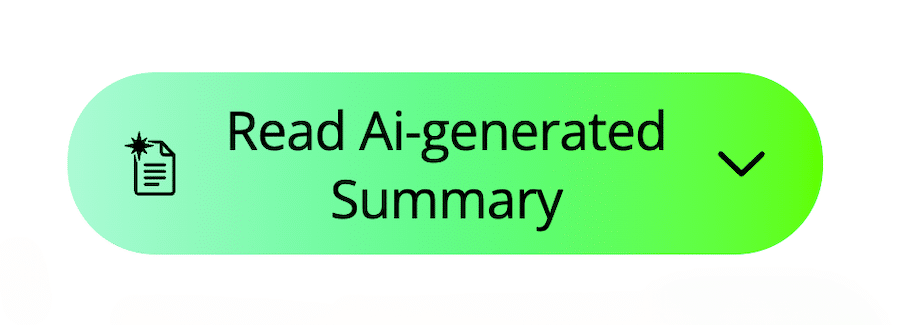
That’s why we’re committed to being a trusted, human-centered resource. Here’s how we’re responding:
- Creating clear, accurate content written by real professionals
Our blog, guides, and educational tools are created and reviewed by subject-matter experts to ensure they’re helpful and grounded in reality. - Being transparent about AI use on our website
Any AI-generated textual content, such as summary boxes, is clearly labeled to avoid confusion or overreliance. - Enhancing AI-generated visuals for accuracy and inclusivity
We carefully edit AI images using design tools like Photoshop and Canva to ensure they’re relevant, respectful, and representative of our diverse client base. - Proactively counteracting algorithmic bias
From inclusive imagery to inclusive messaging, we strive to ensure that our digital presence reflects the real-world people we serve.
💡 At Express Legal Funding, we bridge the gap between online research and real-world legal support — empowering clients with trustworthy information and reliable funding options.
Final Takeaways: What Americans Really Think About ChatGPT
- 60% have used ChatGPT
- Trust is high in practical areas like career and education
- Trust is low in medical and legal categories
- Older adults and high earners are the most skeptical
- Only 14.1% strongly believe ChatGPT will benefit humanity
The takeaway? ChatGPT is growing in use and relevance, but trust still varies widely — and must be earned.
Frequently Asked Questions About ChatGPT and Trust
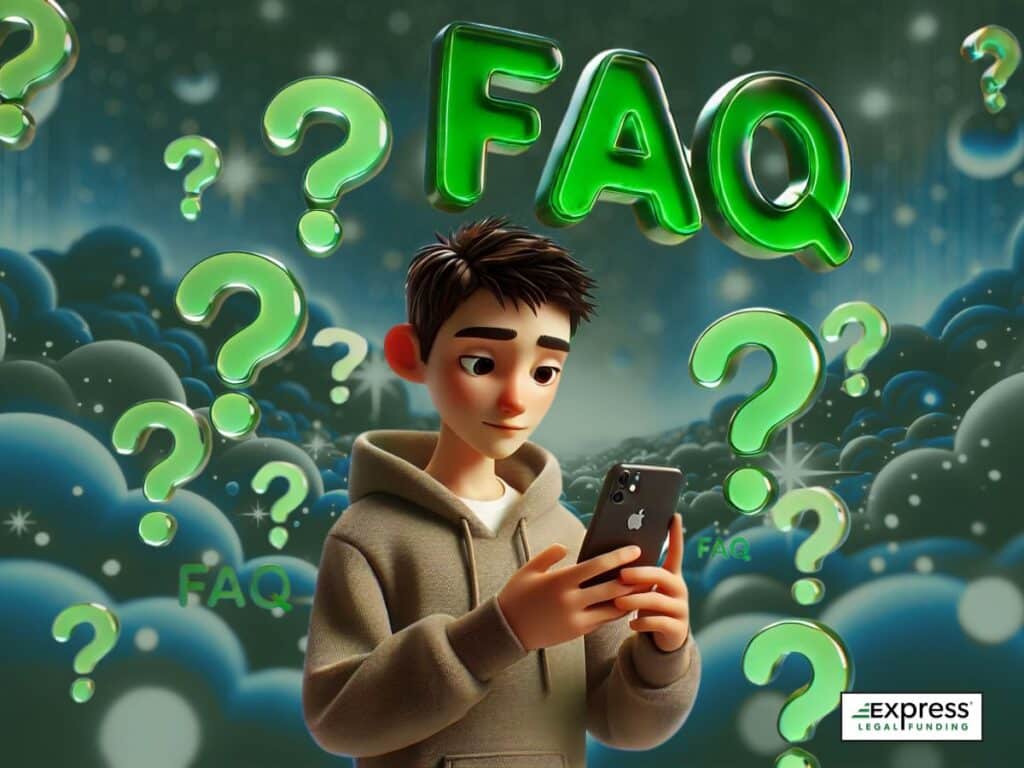
Can I trust ChatGPT?
ChatGPT can be trusted for general advice and everyday questions, especially in areas like education, writing, or brainstorming. In a 2025 survey, 70% of users said it gave helpful advice. However, because it doesn’t truly “understand” information, it can sometimes generate confident-sounding but incorrect answers. For sensitive decisions — legal, financial, or medical — it’s best to verify information or consult a professional.
Is there any danger in using ChatGPT?
Yes, especially when users rely on it for complex or high-risk advice. ChatGPT can make errors, hallucinate facts, or misinterpret context, which may lead to poor decisions if not double-checked. In a 2025 study, 10% of users said ChatGPT caused a problem. It’s a helpful tool, but like any AI, it lacks accountability, making user discretion essential.
Do people trust ChatGPT more than Google?
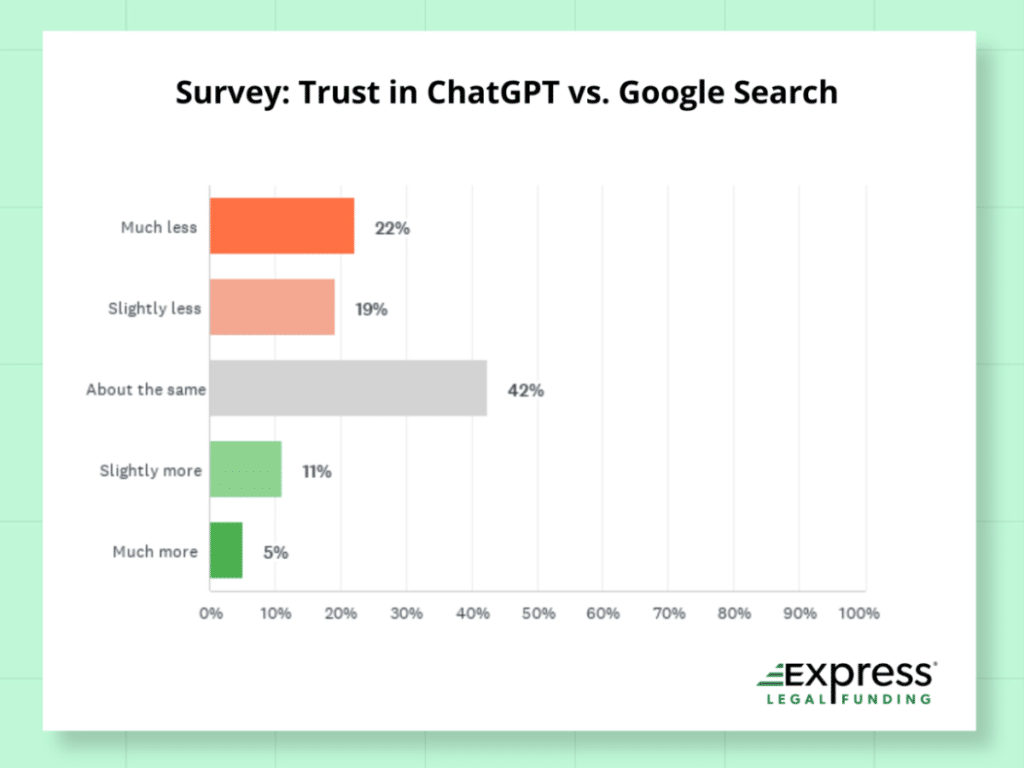
No, most users don’t trust ChatGPT more than Google. In a national survey, 42.9% said they trust both equally, while 40.8% said they trust ChatGPT less. Only 16.3% said they trust it more. This reflects Google’s long-standing dominance in search — and that many still view the AI tool as experimental or unproven.
How many Americans have used ChatGPT for advice?
In a national survey, 60% of adults said they had used ChatGPT for advice or information. Younger people, particularly those aged 18–29, were far more likely to have used it (84%). This suggests growing comfort with AI tools among tech-savvy demographics, while older and higher-income groups remain more cautious or unfamiliar.
What do people use ChatGPT for?
Most people use ChatGPT for practical topics like learning, budgeting, and shopping. In a 2025 survey of U.S. adults, the most common uses were:
- 📘 Educational help (50%)
- 💰 Financial advice (33.3%)
- 🛍️ Product recommendations (30%)
These are relatively low-risk topics where ChatGPT’s fast, conversational answers are seen as useful.
Fewer users relied on it for legal (13.3%) or medical (23.3%) advice, reflecting lower trust in high-stakes areas.
Can ChatGPT be trusted more than a human expert?
Some people say yes, especially when human experts are hard to access or perceived as biased. According to a 2025 survey, 34.3% of respondents said they’d trust ChatGPT more than a human expert in certain situations. However, most people (65.7%) said real professionals are more trustworthy, especially in areas that require nuance, empathy, or case-specific expertise.
ChatGPT should not be trusted more than licensed professionals for legal, medical, or financial advice. Always consult a qualified expert before making important decisions.
Will ChatGPT improve your personal finances?
Only 11.1% of Americans surveyed believe ChatGPT will improve their finances — despite many using it for financial advice. This gap highlights growing uncertainty around whether AI-generated guidance is personalized, trustworthy, or practical in real-life financial decisions.
Concerns about AI agents replacing human jobs may also be fueling skepticism about ChatGPT’s role in improving financial outcomes.
Who is most likely to trust ChatGPT?
According to a 2025 survey, younger adults, lower-income earners, and smartphone users are most likely to trust ChatGPT. These groups may be more tech-native, more open to trying AI tools, or feel underserved by traditional expert systems. In contrast, older adults and high-income earners were more skeptical and cautious in their responses.
Do Americans think ChatGPT will help or harm society?
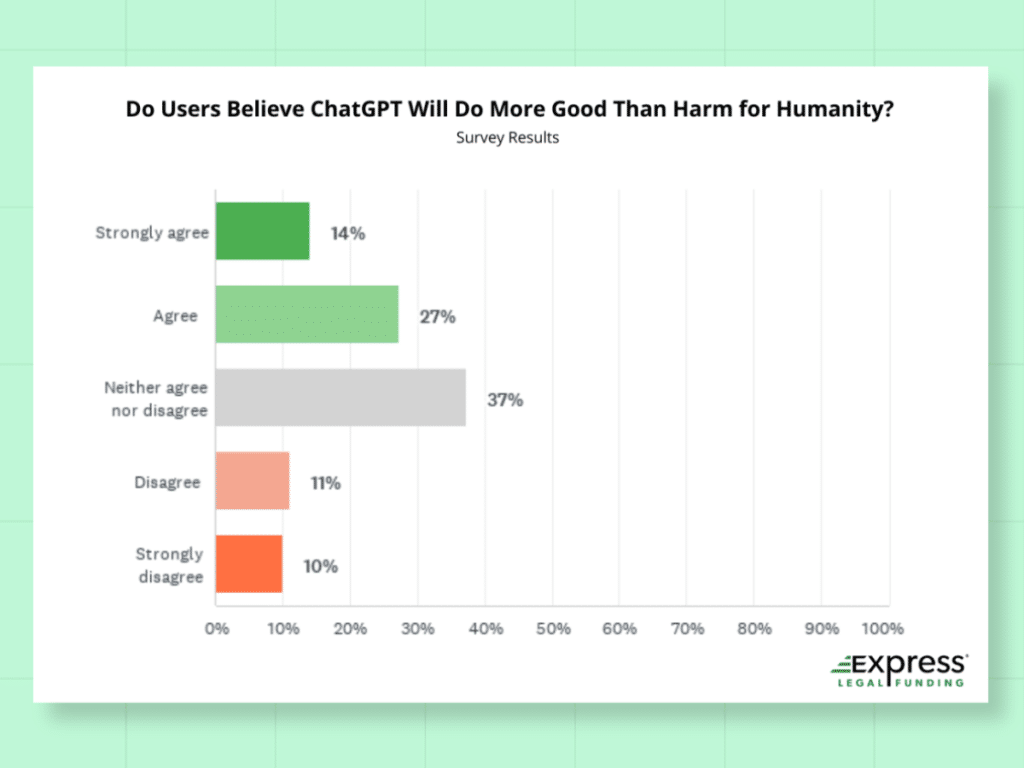
According to a 2025 survey, Americans are unsure about whether they believe ChatGPT will help or harm society. Only 14.1% strongly agreed it would help humanity, while 24.2% believed it may do more harm than good. The largest group (37.4%) was neutral. This suggests a growing awareness of both the opportunities and ethical concerns surrounding AI, especially regarding misinformation, bias, and job disruption.
Should ChatGPT give legal or medical advice?
The majority of Americans say no. According to a 2025 survey, 63.6% believe ChatGPT should not be allowed to give legal or medical advice. Despite its usefulness, most people recognize the risks: it lacks credentials, can’t interpret laws or symptoms with full context, and could lead to serious consequences if misused.
What topics do people trust ChatGPT with the most?
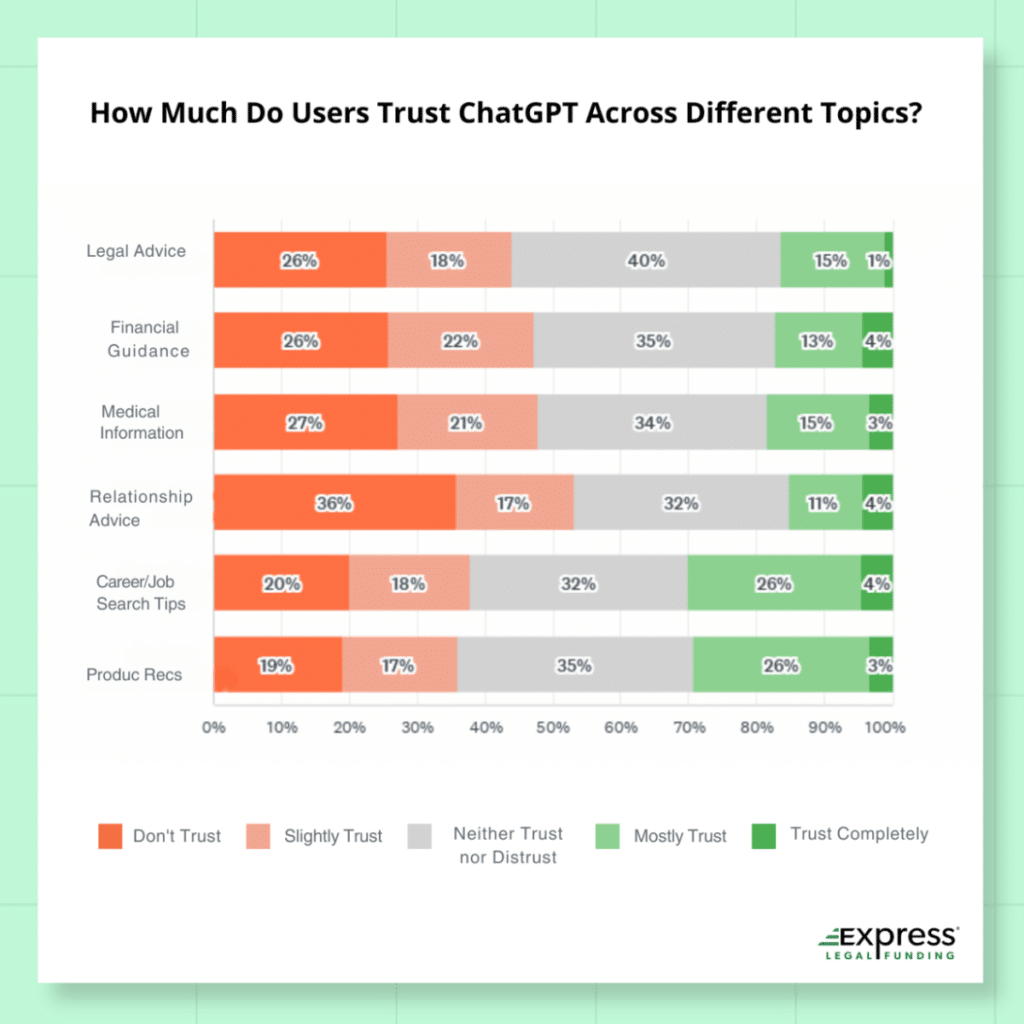
According to 2025 survey data, ChatGPT is most trusted for low-stakes topics like career advice (61.7%), product recommendations (60.0%), and educational help (55.0%). Trust declines for high-risk areas like legal (28.3%) and medical advice (35.0%), where accuracy and expert judgment are essential.
Does using ChatGPT make people trust it more?
Yes, experience appears to increase trust. In a 2025 survey, 55% of people who had used ChatGPT said they believe it will benefit humanity, compared to just 16% of non-users. This suggests that direct interaction with the AI helps build confidence, while those unfamiliar with the tool remain more skeptical.
Is ChatGPT safe for legal questions?
ChatGPT is not considered safe for legal advice. While it can offer general legal information, it cannot interpret laws, assess evidence, or provide case-specific guidance. In a 2025 survey, only 28.3% of respondents said they trust ChatGPT with legal topics, and 63.6% believed it should not be allowed to give legal or medical advice. These results highlight the risks of relying on AI for high-stakes decisions.
For accurate and personalized legal help, it’s best to consult a licensed lawyer.
Can ChatGPT give medical advice?
ChatGPT can provide general medical information, but it should never replace professional medical advice. In a 2025 survey, only 35% of respondents said they trust ChatGPT on medical topics. Since it cannot assess symptoms, perform exams, or offer personalized care, it’s essential to consult a licensed healthcare provider for accurate diagnosis and treatment.
Should I trust ChatGPT with financial advice?
While ChatGPT can help users understand basic financial topics and budgeting strategies, it should not replace personalized financial advice from a professional. In a 2025 survey, only 11.1% of respondents believed ChatGPT would improve their finances, which highlights low public trust in AI for financial decision-making and growing concerns about AI replacing human expertise leading to job loss.
What do most people use ChatGPT for?
According to a 2025 survey, most people use ChatGPT for educational support (50%), financial advice (33.3%), and product recommendations (30%). Practical, low-risk topics are where users feel most comfortable. In contrast, fewer users turn to ChatGPT for high-stakes topics like legal or medical advice, where trust and accuracy are more critical.
Does ChatGPT give correct answers?
ChatGPT often provides helpful and accurate answers, but it can still generate errors or misleading information. In a 2025 survey, 70% of users found its advice helpful, while 10% said it caused problems. To stay safe, it’s best to double-check ChatGPT responses with trusted, expert sources—especially for important decisions that can affect your well-being.
How do different generations feel about AI?
Younger generations are significantly more open to using and trusting AI tools like ChatGPT. In a 2025 survey, 84% of adults aged 18–29 had used ChatGPT, compared to just 22.7% of those aged 60 and older. The data shows a clear trend: trust in AI declines with age, with older adults being more skeptical about its safety and reliability.
Additional Resources:
- Federal Trade Commission – AI and the Risk of Consumer Harm. Jan. 3, 2025. Read the full article on FTC.gov
- National Institute of Standards and Technology – Powerful AI Is Already Here. To Use It Responsibly, We Need to Mitigate Bias. Feb. 15, 2023. Read the full article on NIST.gov.
- OpenAI – Our Approach to AI Safety. April. 5, 2023. Read the full article on OpenAI.com
- WordLift – Building Trust in AI and SEO. Aug. 9, 2024. Read the full article on WordLift.io



